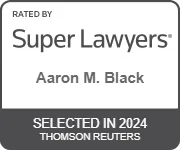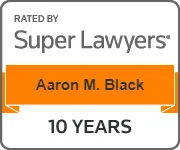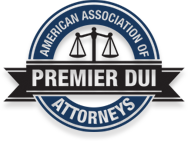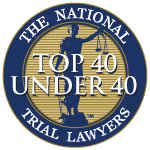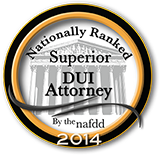Extreme DUI .153 (Phoenix) - Dismissed
Back to all DUI & Criminal Defense Case Results
Client was visiting his girlfriend and in Arizona from Texas. He was pulled over for traveling over 90mph of the freeway. Once stopped the police conducted a DUI investigation and my client was arrested. He called me the next day and I was on the case. After investigating the Extreme DUI and interviewing the officer it was learned that my client requested to speak to his attorney who lives in Texas. However, the officer told my client he could not make long distance called from the jail. My client did not have his cell phone because the officer did not allow my client to have it. So, like the best Phoenix lawyers do, I filed a motion. The law is clear that if a DUI suspect asks for a lawyer, they get one. If you hire me, not only will you deal only with me, you will have courtroom experience and an attorney who has the legal knowledge to write motions such as this:
The State Has the Burden to Prove Lawful Acquisition of Blood Test Results.
According to Rodriguez v. Arellano, 194 Ariz. 211 (1999), “The prosecutor shall have the burden of proving, by a preponderance of the evidence, the lawfulness in all respects of the acquisition of all evidence which the prosecutor will use at trial.” Id., at 213 (citing Rule 16.2(b), Arizona Rules of Criminal Procedure). (Emphasis supplied). This burden arises when the “…defendant has come forward with evidence of specific circumstances which establish a prima facie case that the evidence taken should be suppressed.” Id.
Here, the defendant can surely establish a prima facie case that he was denied his Right to Counsel under the Sixth and Fourteenth Amendments of the United States Constitution, Article 2, § 24 of the Arizona State Constitution, and Rule 6.1(a), Arizona Rules of Criminal Procedure. The State will not be able to meet its burden to show Mr. _______’s blood test results were lawfully obtained as they were acquired after Mr. _________'s request for, and denial of, counsel.
Mr. _________ Clearly Invoked His Right to Counsel and was Denied this Right.
Both the Sixth Amendment to the United States Constitution and Article 2, Section 24, of the Arizona Constitution guarantee a defendant the right to assistance of counsel. Additionally, Arizona Rule of Criminal Procedure 6.1.a provides that the right to be represented by an attorney includes the right to consult with an attorney, in private, “as soon as feasible after a defendant is taken into custody.” State v. Penney, 229 Ariz. 32, 35 ¶ 10 (Div. 1, 2012). Under these principles, a DUI suspect's rights are violated if police do not give him a reasonable opportunity to consult with counsel. Id., State v. Sanders, 194 Ariz. 156, 158, ¶ 8, 978 P.2d 133, 135 (App.1998) (right to counsel violated when police refused suspect's request for station's phone number so he could leave a number for his lawyer to call); Martinez v. Superior Court, 181 Ariz. 467, 468, 891 P.2d 934, 935 (App.1994) (“police cannot interfere with [suspect's] reasonable efforts to communicate with an attorney”); see Bhattacharya v. Commonwealth, 292 S.W.3d 901, 905 (Ky.App.2009) (police must give DUI suspect “some means of obtaining attorneys' telephone numbers”); McNaughton v. Comm'r of Pub. Safety, 536 N.W.2d 912, 914 (Minn.App.1995) (police “ ‘must assist’ in the vindication” of a DUI suspect's right to counsel; suspect's rights were abridged when police gave him a list of five preselected lawyers.)
The general rule is that an accused has a right to contact an attorney as soon after arrest as feasible if such contact does not interfere with the matter at hand. McNutt v. Superior Court, 133 Ariz. 7, 10 (1982).
A person is always entitled to the assistance of an attorney whether he is in custody or not. Of course, if he is not in custody, he may exercise that right when and where he wishes. If he is in custody, he may exercise his right to an attorney and the state may not reasonably restrict that right. Kunzler v. Superior Court, 154 Ariz. 568, 569 (1987). In Kunzler, the defendant was arrested for DWI and wished to contact his attorney prior to taking any breath tests. The police denied his request and the Court ruled that:
“[L]aw enforcement officials may not, without justification, prevent access between the criminal accused and his lawyer, available in person or by immediate telephone communication, if such access does not interfere unduly with the matter at hand.”
Id, 154 Ariz. at 570, citing McNutt v. Superior Court, 133 Ariz. 7, 648 P.2d 122 (1982). When a DUI suspect invokes his right to counsel, police must provide the suspect with reasonable means of contacting a lawyer. Penney, 229 Ariz. at 36 ¶ 14.
In State v. Rosengren, 199 Ariz. 112, 14 P.3d 303 (App. 2000), the Arizona Court of Appeals found that a defendant’s right to counsel was violated even where the arresting officer allowed the defendant to call an attorney out of a local phone book. See Rosengren, 199 Ariz. at 116, 14 P.3d at 307. In Rosengren, the Defendant requested that he be allowed to call a specific attorney, his father, who was an out-of-stat attorney. Id. The officers refused his request, but gave the Defendant a local phone book and a telephone. Id. The defendant was not allowed to call out of state. The defendant was only given the opportunity to call a local lawyer. The defendant then refused to call a local attorney and he refused to consent to a blood draw. Id.
The facts of Rosengren regarding the right to counsel, the defendant’s actions, and the officer’s actions are identical to Mr. ____________’s facts. The court held:
¶ 10 Under Rule 6.1(a), Ariz.R.Crim.P., 16A A.R.S., Rosengren had “the right to consult in private with an attorney, or the attorney's agent, as soon as feasible after [he was] taken into custody.” 2 That rule “recognizes the federal and state constitutional right to counsel.” Kunzler v. Pima County Superior Court, 154 Ariz. 568, 569, 744 P.2d 669, 670 (1987). The trial court found, and the state concedes, that the police “acted improperly” and intentionally violated Rosengren's right to counsel by not honoring his request to speak with his father, an attorney. The trial court also found, and the state does not contest, that affording Rosengren that opportunity would not have unduly interfered with the police investigation. See id. (state “may not unreasonably restrict” in-custody suspect's “right to an attorney”); State v. Holland, 147 Ariz. 453, 455, 711 P.2d 592, 594 (1985) (state may not, “without justification, prevent access between a defendant and his lawyer, if available, in person or by telephone, when such access would not unduly delay the D[U]I investigation and arrest”).
Suppression of the Blood Test and Dismissal is the Appropriate Remedy in the Present Case
The Sanders court unequivocally held that the “(t)he remedy for a violation of the right to counsel is dismissal.” The Supreme Court of the United States declined review of Sanders on November 1, 1999. 528 US. 982 (1999). It is well established that suppression of evidence is the appropriate remedy for violations of a Defendant’s Right to Counsel. In Kunzler, the Supreme Court ruled “…any evidence obtained following [a] violation of Defendant's Right to Counsel must be suppressed.” Id, 154 Ariz. at 570. (See also State v. Keyonnie, 181 Ariz. 485, 892 P.2d 205 (App. Div.1 1995); and State v. Vannoy, 177 Ariz. 206, 866 P.2d 874 (App. Div.1 1993)). Further, the Court of Appeals for Division 2 followed this blanket approach to suppression in State v. Rosengren, 199 Ariz. 112, App. Div. 2 2000).
In State v. Rosengren, 199 Ariz. 112 (App. Div. 1 2000), the Court of Appeals upheld suppression but declined to dismiss under the particular facts of the case. The Court in Rosengren, citing to Keyonnie, noted that dismissal is not the exclusive or automatic remedy notwithstanding the broad language in Sanders. Rosengren, 199 Ariz. at 118 (App. Div. 1 2000) (citing to State v. Keyonnie, 181 Ariz. 485 (App.1995). It then stated that dismissal was appropriate only if evidence of intoxication is essential to the prosecution of the offense and if the violation of the right to counsel “foreclosed a fair trial by preventing [the defendant] from collecting exculpatory evidence no longer available.” Id. (citing McNutt, 133 Ariz. at 10; and Keyonnie). Rosengren did not issue a dismissal because there were multiple blood draws over a period of time. The court also found that some exculpatory evidence still existed in the form of video and audio. Rosengren at 309, ¶ 16. Video, audio, and multiple blood draws do not exist in the case before this court.
The Arizona Supreme Court previously stated why dismissal is appropriate when the State’s action has foreclosed a fair trial by preventing the defendant from collecting exculpatory evidence no longer available:
Because we value the right to counsel so highly, Gideon v. Wainwright, 372 U.S. 335, 83 S.Ct. 792, 9 L.Ed.2d 799 (1963), when the right to counsel is violated, then the conviction obtained as a direct result must be set aside. This is the rule because it is impossible to foresee what advice would have been given to a defendant had he been able to confer privately with counsel. It is quite possible that he would have been instructed to obtain, in some manner, exculpatory evidence.
State v. Holland, 147 Ariz. 453, 456 (1985); See also State v. Sanders, 194 Ariz. 156, at 158 (App.1998) (“The remedy for a violation of the right to counsel [in the DUI context] is dismissal[]”) (citing State v. Holland, 147 Ariz. 453, at 456); Rosengren, supra, (citing to McNutt).
Our Supreme Court, of course, previously noted that it is crucial in a DUI investigation for both the State and the defendant to gather evidence relevant to intoxication close in time to when the defendant allegedly committed the crime. McNutt v. Superior Court, 133 Ariz. 7, 10 at n.2 (1982). This evidence gathering is not limited to chemical tests since it also includes other forms of potentially exculpatory evidence “such as observations by non-police witnesses of a suspect’s physical appearance and function.” Rosengren, 199 Ariz. 112, at 116, (citing to State ex rel. Webb v. City Court, 25 Ariz.App. 214, 216 (1975), and United States v. Canane, 622 F.Supp. 279, 281 (W.D.N.C.1985)(recognizing the need for suspect's “access to his counsel, friends, relatives, or some disinterested person within a relatively short time after his arrest[]”).
Thus, a DUI suspect has a qualified due process right to gather independent evidence of sobriety while it still exists, so long as exercise of that right does not unduly delay or interfere with the law enforcement investigation. See Kunzler; Holland; Webb; See also Montano v. Superior Court, 149 Ariz. 385, 389, 719 P.2d 271, 275 (1986). And, "[t]he right to counsel is an extension of the doctrine that defendants have the right to gather independent exculpatory evidence." State v. Transon, 186 Ariz. 482, 485 (App. Div. 1 1996). See also Rosengren, supra.
If you have been arrested for Extreme DUI in Phoenix, Arizona and you requested to speak with a lawyer, call me at 480-729-1683, we will talk.


